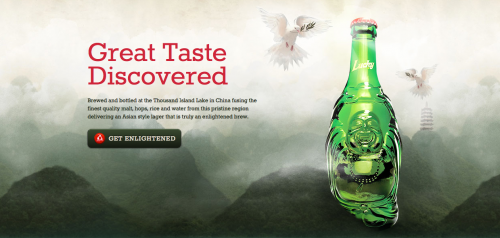Buddhist hipsters of the world, rejoice! A couple of Australian entrepreneurs have started to brew “Lucky Buddha Beer,” which comes with the tagline…oh, just you wait for this one…”Get Lucky.”
Sigh. Always the clever ones, those Australian entrepreneurs. Wouldn’t it be so nice if getting enlightened was as simple as buying a kitschy beer? The makers of Lucky Buddha Beer’s website seem to think that it’s as easy as clicking on a button:

I’m praying to everything that I hold dear in this life that the advertising copy on their site was written with a healthy dose of humor:
In a world that’s full of change, it’s good to know that Lucky Beer offers something consistently good natured. Although the distinctive laughing Buddha bottle is central to our brand, Lucky Beer—and the good fortune it shares—transcends all religions, cultural boundaries and beliefs.
In its simplest form, we stand for goodwill for all humanity.
“If you think that enlightenment is separate from the drinking of beer you have not yet understood” —Ancient Taoist Saying.
I’m not sure if I really made the logical leaps from the first sentence to the second to the third…
But no point being snarky about it, I suppose, especially since I have far more interesting things to share with you today. The first of which is this article from National Geographic, “Blood Ivory” by Bryan Christy, that explores the link between illegal elephant poaching and religion. The ivory taken from these hunted elephants is in high-demand for religious carvings, especially in Thailand and China. In Thailand, it is used particularly to make Buddhist amulets, a business being run by a man nicknamed the “Elephant Monk”:
“Ivory removes bad spirits,” the Elephant Monk tells me. He wears the brown robes of a forest monk and chews steadily on betel-infused maak, which he spits out in great blood-like wads. He also wears ivory. Around his neck is an ivory elephant-head pendant suspended from ivory prayer beads representing the 108 human passions.
The Elephant Monk’s main income is from amulets, and he offers a strange variety, including images of himself and of the Buddha as well as amulets made with plastic-encased bits of bone from the skulls of dead pregnant women, pure corpse oil, soil from seven cemeteries, tiger fur, elephant skin, and carved ivory. Business is good enough that he’s building a new temple, Wat Suanpah, modeled in part after Thailand’s popular tiger parks—often front organizations, critics say, for the illegal tiger trade. The Elephant Monk suffered similar controversy when a recent television exposé reported that he’d starved an elephant to death for its skin and ivory, but he says it died of natural causes and he was only holding an elephant funeral.
The article is shocking in that many of those involved in the ivory trade display absolutely no remorse about poaching elephants for their tusks. The journalist asks one young man in the industry if he thinks about the elephants. “Not at all,” the man replies.
Don’t go losing your faith in humanity just yet, though. I promise that this blog post by comedian Chris Gethard will make you feel better (while simultaneously making you cry). One of his fans asked him on Tumblr if he had ever dealt with suicidal thoughts, telling the comedian that he couldn’t leave his house without panicking anymore. Gethard’s answer is the most impassioned and poignant response to a cry for help that I think I’ve ever read. You can tell that it’s coming straight from his heart. Really, I challenge you to make it through the whole thing without at least tearing up. You can read it here.
And since I feel like I owe you a light piece of news now, enjoy watching Stephen Colbert riff on Buddhism in the video below.
The Colbert Report
Get More: Colbert Report Full Episodes,Political Humor & Satire Blog,Video Archive
Thank you for subscribing to Tricycle! As a nonprofit, we depend on readers like you to keep Buddhist teachings and practices widely available.